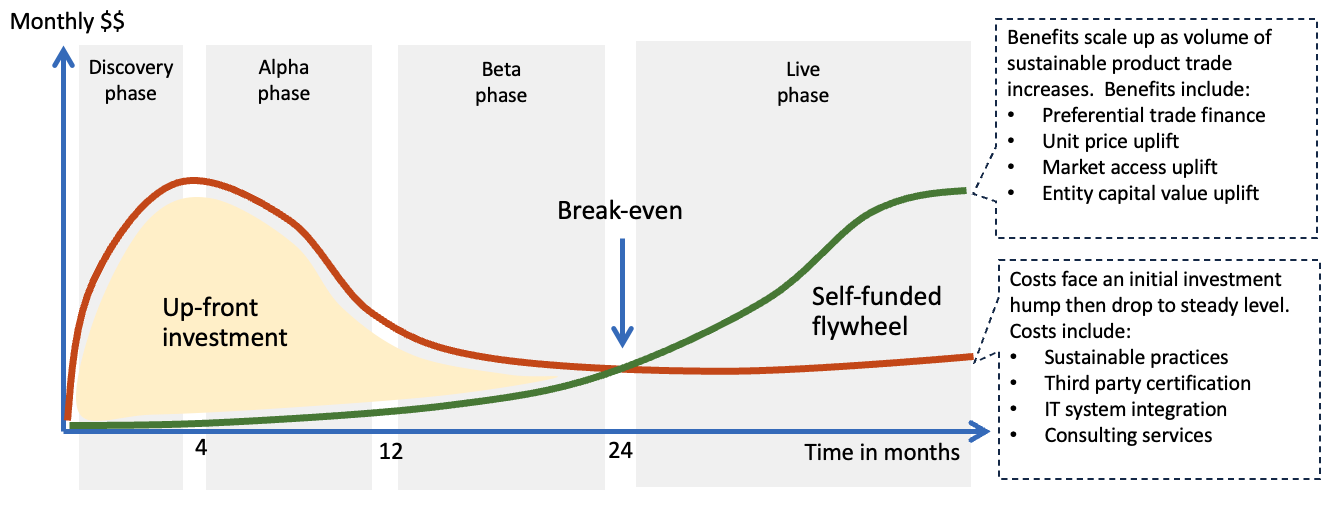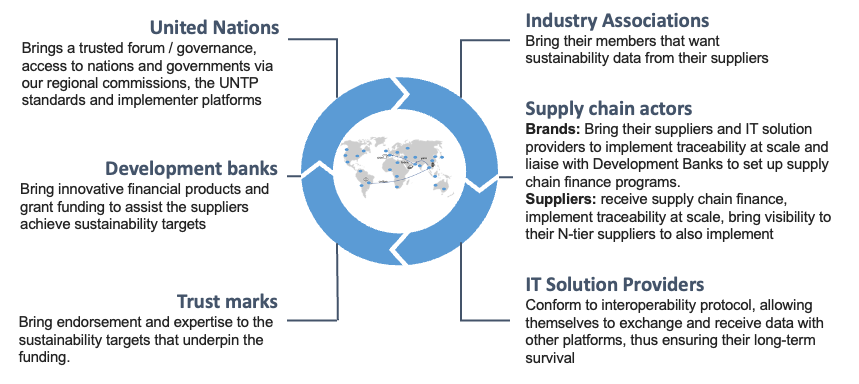Please note that this content is under development and is not ready for implementation. This status message will be updated as content development progresses.
Community Activation Program
Introduction
The Community Activation Program (CAP) serves as a comprehensive framework and collaborative community designed to support industries in developing and implementing their own UNTP extension projects. Communities, supported by UNECE, continue to thrive long after the project is complete, aiding industries in adopting extensions and associated tools.
Recognizing the need for industry-wide collaboration to address challenges such as interoperability and costs, CAP offers structured solutions. Corporations often prefer not to act in isolation due to the risks and challenges associated with independent initiatives; CAP addresses this by fostering collective action, enabling industries to achieve shared goals through collaboration and mutual support. By leveraging a unified methodology, comprehensive toolkit, open-source software platforms, and globally recognized standards, CAP empowers industries to reduce costs, improve efficiency, and build trust among stakeholders, including regulators, financial institutions, and software vendors. This fosters deeper collaboration and shared benefits across sectors.
Through CAP, industries can assess the value of their extension projects and effectively engage diverse stakeholders to drive adoption.
Starting a UNTP project requires careful consideration of specific foundational elements that ensure the project’s alignment with industry needs and its potential for widespread adoption. These include:
-
Catalyst for adoption: Identifying a clear and compelling driver for the project, such as new regulatory requirements (e.g., EUDR or Carbon Border Adjustment Mechanism), or the need to align with a national or sectoral traceability strategy, provides focus and urgency for stakeholders.
-
Engaged buyers: Buyers must perceive significant value in supplier data, such as enhanced product quality, compliance assurance, or risk mitigation. This engagement is essential to drive demand for the project outcomes.
-
Committed suppliers: Suppliers must be willing and able to share critical data with buyers, especially when the project demonstrates a direct benefit to them, such as cost reductions, increased market access, or reputational gains.
-
Funding mechanism: Robust and sustainable funding is crucial for supporting the project’s initial phases, covering development, outreach, and pilot testing. This ensures that the project gains traction and delivers early successes to build momentum.
CAP delivers value to industries and creates a flywheel of adoption
Industry associations engaging with CAP to develop UNTP extensions benefit from:
- Shared costs and reduced financial risks for members.
- Increased value proposition for association membership.
- Enhanced trust and credibility within industries and stakeholders.
- Accelerated momentum for product passports, trust services, and registries.
- Alignment with emerging extensions, solving interoperability challenges.
- Access to global experts, case studies, and robust tools.
As extension projects mature, they generate a self-sustaining flywheel effect. This mechanism drives innovation and growth by aligning stakeholders, fostering collaboration, and incentivizing continuous improvement. By enabling shared benefits, CAP ensures long-term progress and success.

CAP supports a structured approach to extension development and adoption
The CAP toolkit offers a proven, six-phase methodology:
Inception Phase: This initial phase is centered on identifying key catalysts for change, such as emerging regulations, national traceability strategies, or industry-specific challenges. Stakeholders work collaboratively to build consensus, define project goals, and create a compelling business case that articulates value. Communities may already exist and catalyze around a pressing business problem, identifying UNTP as the most effective solution. At the end of this phase, a community may formally register their extension with UNTP, solidifying their commitment and alignment with global standards. Securing initial funding ensures the project is adequately resourced for success.
Discovery Phase: In this exploratory phase, current practices are systematically mapped to identify strengths, gaps, and opportunities. Stakeholders prioritize areas for improvement and establish clear objectives that align with industry needs and regulatory demands. This phase sets the foundation for a targeted and actionable implementation plan.
Alpha Phase: During the alpha phase, prototypes of the proposed systems and frameworks are developed and tested within controlled environments. This stage allows stakeholders to assess functionality, refine tools, and demonstrate tangible value to participants. Feedback loops are critical in ensuring the solution is robust and addresses real-world challenges effectively.
Beta Phase: Building on the alpha phase, the beta phase scales the project to a broader set of participants. Emphasis is placed on resolving interoperability challenges, ensuring compatibility with existing systems, and refining operational workflows. The project is tested in live scenarios to validate its scalability and effectiveness.
Live Phase: The final phase transitions the project into full-scale implementation. Stakeholders work to achieve widespread adoption, leveraging continuous improvement mechanisms to adapt to evolving industry needs. This phase ensures the extension remains sustainable, impactful, and aligned with broader industry objectives.
A successful UNTP extension project is a team effort
UNTP extension projects thrive through collaboration with a wide range of stakeholders.

CAP member stakeholders bring unique needs and derive tailored benefits:
-
Industry associations: Drive collective industry efforts by providing leadership and fostering collaboration to develop interoperable standards, ensuring enhanced member value and a unified industry voice.
-
Suppliers: Contribute essential data that ensures compliance with ESG standards and enables access to broader markets. Their participation demonstrates alignment with global sustainability efforts and supports trust across supply chains.
-
Buyers: Play a pivotal role by demanding traceability and guiding the adoption of data standards. This ensures reliable and transparent information flow, bolstering brand trust and improving consumer confidence.
-
Trust marks and government agencies: Provide critical policy frameworks and credentials that establish the credibility of sustainability efforts. They ensure alignment with environmental, social, and governance (ESG) goals and offer a foundation for industry-wide adoption.
-
Development banks: Facilitate sustainable growth by offering ESG-linked financing and investment mechanisms. These institutions provide crucial resources that reduce financial barriers and encourage broader participation in UNTP extension projects.
-
IT solution providers: Deliver the technical expertise needed to develop traceability systems and ensure seamless data interoperability. Their innovations enable scalable and robust solutions for managing complex supply chains.
-
UNECE: Act as a global steward, offering governance frameworks that ensure alignment and interoperability across projects. Their involvement fosters cooperation, providing guidance that strengthens the foundation for sustainable and globally consistent practices.
A UNTP extension team requires specialist skills
To deliver a successful extension project, teams require a range of specialist skills. In addition to deep industry knowledge brought by the industry association and its members, a project should have:
-
Project management expertise: Successful execution of UNTP extension projects relies heavily on effective project management. Teams must coordinate a wide range of activities, oversee resource allocation, and ensure that milestones are achieved on time. They must navigate complex interdependencies while maintaining a clear focus on objectives.
-
IT systems knowledge: Teams need expertise in deploying and integrating advanced tools for data exchange, supply chain tracking, conformance testing, and process automation. Knowledge of software compatibility, system scalability, and data security is vital to ensure seamless operations.
-
Trust architecture expertise: A trust architect is essential in ensuring that the systems and frameworks designed foster credibility and reliability among stakeholders. This role involves creating mechanisms to validate and certify data integrity, establishing clear accountability processes, and building frameworks that enhance trust across supply chains. Trust architects play a pivotal role in ensuring all participants have confidence in the system, paving the way for sustained adoption and collaborative success.
-
ESG standards expertise: Proficiency in environmental, social, and governance (ESG) standards is critical for aligning projects with global sustainability goals. This includes implementing ESG frameworks, tracking compliance, and producing transparent reports that enhance trust among stakeholders.
-
Stakeholder engagement skills: Effective communication and relationship management are essential for fostering collaboration among diverse participants. Teams must balance competing interests, mediate conflicts, and build consensus to align priorities and drive collective action.
-
UNTP extension knowledge: Deep understanding of the UNTP framework is indispensable for designing and implementing extensions that meet global standards. Teams must navigate trade protocols, ensure data governance, and address technical interoperability challenges to deliver scalable and impactful solutions.
CAP membership provides access to valuable resources
As a member of the Community Activation Program, members can access a wide range of resources:
- Frameworks and toolkits: The UNTP Business Case Templates and traceability frameworks provide a comprehensive foundation for project planning. These tools are designed to streamline decision-making processes, ensuring that stakeholders can effectively map out goals, objectives, and resource requirements. The templates also offer guidance for measuring and communicating the value of UNTP extensions to participants and decision-makers.
- UNECE guidance: The UNECE plays a pivotal role in ensuring global alignment and promoting interoperability through its lightweight governance framework. By offering strategic guidance, the UNECE ensures that extension projects remain consistent with international standards, thereby fostering cooperation across borders and industries. This guidance reduces redundancies and ensures projects are sustainable and impactful.
- Consultant support network: Expert advisors provide indispensable support throughout each phase of the project. Their deep understanding of UNTP frameworks and industry best practices ensures that projects are both scalable and aligned with stakeholder needs. Consultants can help troubleshoot complex challenges, streamline workflows, and ensure that all participants achieve their objectives. [to be discussed]
- Collaboration networks: Engaging with established UNTP extension programs offers valuable opportunities for shared learning and innovation. These networks allow new participants to benefit from the experiences of others, adapt proven methodologies, and align their projects with broader industry goals. Collaboration also strengthens the ecosystem, making it easier for new extensions to integrate seamlessly.
- Software tools: A suite of software solutions is available to support UNTP extension projects. These tools facilitate rigorous testing, ensure conformance with established standards, and simplify supply chain management processes. By automating critical workflows and enabling data interoperability, these tools reduce the complexity of project implementation and drive efficiency.
Starting a community is simple
-
Join the community: Join the UNTP chat channel to connect with a UNTP leader and discuss your community needs. By joining the community, participants gain access to ongoing support, exclusive updates, and a global network of peers dedicated to advancing UNTP standards.
-
Download the CAP toolkit: Access resources, including methodologies, templates, and tools. This comprehensive toolkit is designed to guide organizations through every phase of a UNTP extension project, providing detailed frameworks for planning, execution, and evaluation. Toolkit Download
-
Engage with other programs: Collaborate with established communities for shared learning and best practices. These connections allow participants to align their projects with proven methodologies, reducing duplication of effort and accelerating implementation timelines. Extensions Register
